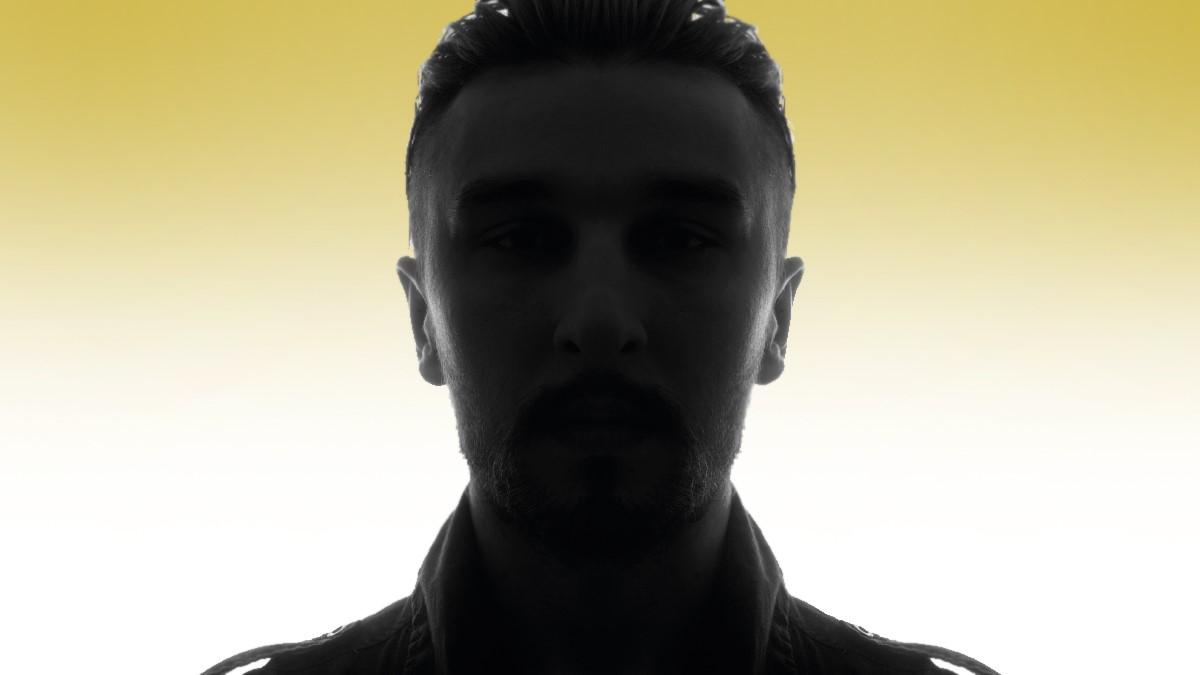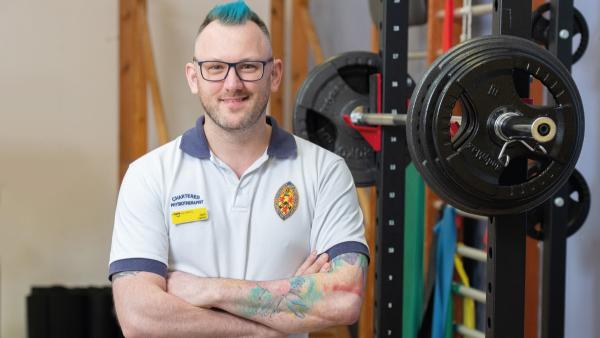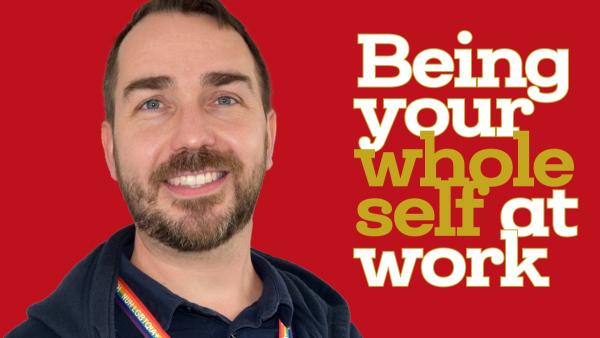To mark LGBT+ History Month Ella Braidwood hears about the benefits of being open about sexuality in the workplace

Whoever you are, it’s incredibly important to feel able to be your whole self in the workplace.
This is certainly the case for LGBTQIA+ physio staff. Being able to be who you are in a safe and inclusive environment at work benefits everyone: themselves, their colleagues, and the level of care they give to their patients.
Sadly, LGBTQIA+ people are still having to hide themselves at work. In 2018, a report by charity Stonewall found that over a third of LGBTQIA+ staff (35 per cent) hid this at work for fear of discrimination.
Microaggressions are just one reason why some LGBTQIA+ physio workers may feel less able to bring their full selves to work. These are subtle or indirect statements or actions, which may be unintentional, that discriminate against a marginalised group. For example, it could be the use of the word “gay” as a derogatory term.
That’s why the CSP launched its Call Out Microaggressions campaign recently. This aims to reduce microaggressions faced by physiotherapy staff and students with marginalised protected characteristics, in order to improve their working lives and their physical and mental health.
The campaign seeks to empower physiotherapy to be an inclusive and welcoming profession that values diversity and difference. And it hopes to enable members with different needs, identities, backgrounds and experiences to feel they belong.
To mark this year’s LGBT+ History Month, we’ve spoken to two physiotherapists – members of the CSP’s LGBTQIA+ network – about their experiences in the workplace, including how they’ve been impacted by microaggressions.
We also discuss the importance of being your whole self at work – and how the LGBTQIA+ network has grown over the years.
Jack Holroyde, 36, London (he/him), international recruitment and development lead for Lewisham and Greenwich NHS Trust

My sexuality is a core part of who I am. I’ve always been involved in the queer community. I’ve been an activist for 20-plus years. When I became a physio, I was forced into a box of professionalism. I wasn’t consciously forced into that box, which I think is an important thing to say. But, when we’re students, we are rewarded when we display behaviour that is similar to our clinical educators, that’s how you get better grades. You learn from your clinical educators how to behave at work. But within physio we lack diversity.
So, actually, we’re teaching students a very, very narrow range of who they can be at work.
But you can be your true self, and your whole self, at work and maintain professionalism. At one point, one’s identity has to assert itself – and my employer has been fantastic. I’ve been able to assert my working-class background, my socialist mentality, my LGBT+ identity, and kind of really put it down and say, “This is who I am, and these are the reasons why I can provide better care to patients.”
The bottom line is that it unlocks potential: if I’m not being me, I’m not progressing. Because patients love to see – and want to speak to – a human being that they relate to. They don’t want to speak to a generic healthcare professional. They don’t want to say, “I went to a physio”, they want to say, “I saw this guy called Jack, and I had a great time.”
My mentor once said to me, “If you don’t bring your whole self to work, you’re doing yourself and you’re doing your patients a disservice.” For example, a former patient had lots of housing problems. He had also been sexually assaulted by his partner. But I had the information as a queer person about how to get him housed: that wasn’t me as a physio doing that, that was me as a fellow gay man.
The only humane response was to be a gay man in that situation, not to be a physio in that situation. Literally, by that evening, he had a bed. That is because I’m queer and active in the community.
Be your whole self
If we don’t bring this stuff to work, then we’re leaving half of our lived experience at home.
If we’re not bringing ourselves to work, then queer patients are not getting that from anyone. Or, even worse, they’re having to mask and pretend and lie in order to feel like they have any kind of rapport, in order to feel like they’re welcome in that clinic space.
Also, in terms of colleagues, it’s deeply unsatisfying to work in a place where everyone’s the same. Diversity – having a rich colour palette to paint a painting with – brings a wide range of cultural experiences, a wide range of problem-solving mentalities, and a wide range of social conversations and interactions.
I was secondarily involved in the CSP’s LGBTQIA+ network from day one, and had been to a couple of events here and there, but I really got involved in the network about a year ago. It’s been a really amazing experience for me. There’s our WhatsApp group and we can have proper conversations, we can discuss things and, as things come up, we can provide support and also coordinate responses.
I also joined the CSP’s equity, diversity and belonging committee back in February. These things take years to push on, but it’s a place where we’re having some really foundational conversations about what physio is, and how we behave as a union, and what we hold most important – and where our values are as a professional body – in order to allow people to feel belonging.
Awareness is key
I absolutely think the CSP’s new campaign to call out microaggressions is a good thing. Marginalised people know that everywhere in society they face unthinking acts and words from people who might mean well but demonstrate that they’ve not taken time to think and consider our point of view – or our humanity.
Each one can be shrugged off, and raising it with the person concerned can so often feel just not worth it. But, cumulatively, microaggressions contribute to the feeling of a world where the cards are stacked against us – for being who we are, for living our authentic lives.
Awareness is key to helping people realise that the way they brush people off is damaging to their teams and to their culture. It also helps people to see that being called out is an opportunity for growth, to learn how to treat people better, rather than a personal affront or reprimand. It’s critique, not criticism.
We all have space to grow on this and I hope colleagues from across the physiotherapy world can work together to become better colleagues, better clinicians and better humans together.
Michael Pearson, 45, (he/him), improving workplace culture project manager at Nottingham University Hospitals NHS Trust, and a CSP steward

For me, just throughout my life, I have not necessarily felt able to be open about my sexuality in my day-to-day being. Particularly when I started work back in 2005, I very much didn’t talk about it and didn’t acknowledge the fact that I had a partner. I just didn’t know how people would take it – and it was probably my own prejudices. I didn’t necessarily expect people to take it in a good way just because of how society was at the time.
I gradually got better at it, and conversations would come up and I’d refer to my partner, and, as I felt more psychologically safe within a team, I would maybe disclose a bit more. But then, for example, as a rotational band 5, I’d move on, and I’d be in a new team with new people, and you don’t necessarily feel you can say it. So, it’s almost like starting that cycle again and again.
The other thing that I found, particularly with my patients, was that the majority of my physio career, I’ve been working with healthcare of the older person.
Very often, I would get asked by older ladies, “Have you got a girlfriend? Are you married? Have you got kids?” I’d say no, but I wasn’t necessarily forthcoming, either, with who my partner was, or that I had a partner.
Understanding and support
I suppose, thinking back, it meant I denied myself quite a lot. I did a lot of minimalising, not necessarily feeling I could bring myself to work. Was that because of outward, homophobia or anything like that? No, I think it was more my fear of being rejected.
That was definitely how I felt then. I would say now, I’m much more in a position where I don’t mind people knowing. You know, I walk around, I’ve got the LGBTQIA+ network lanyard on. If it comes up in conversation about partners, I don’t deny the fact I have a boyfriend. I also have had from wearing this lanyard – and the NHS rainbow badge as well – a patient who came out to me. So that opened a conversation as well.
I would say definitely I’m more comfortable now. I still don’t go out there waving a big banner, and I think that some of that is to do with how I grew up. When I was a kid, you didn’t talk about it. An element of that still carries on for me now. I do look at other people and go, “Good on you.” Because actually you’ve got the guts to be out there, and to be out and proud.
I joined the CSP’s LGBTQIA+ network around 2007. It was quite a small group at the time. We’d arrange to attend Pride in London, and got involved in the TUC’s LGBT+ conference, but there wasn’t a lot really happening at that point. It was just a nice network, and you got to chat with people.
I would say now it has obviously developed, which I think is because of a combination of different members, who are much more active and vibrant in standing up for rights, I think particularly trans rights at the moment. The WhatsApp group enables regular conversations and it’s a really good, supportive group. You have got people who understand what you’re going through.
The other thing with the group is that it’s really helped me understand more about other groups that fall under the LGBTQIA+ umbrella – for example, I didn’t have lots of knowledge about trans rights before. Now I’ll go and present and do teachings in the hospital about some of these issues and about things that people need to be considerate of like microaggressions.
Calling out microaggressions
I haven’t experienced any direct, face-on homophobia at work, but what I have witnessed a lot is people – this is probably a few years ago now – using “gay” as an expression, such as “that’s so gay”. To the point that I did point out to someone once, but they pushed back and said: “Oh no, I don’t mean it in a bad way.”
There’s obviously a lack of understanding about the harmful impact of microagressions: you might not mean it in that way, but you are using gay as a derogatory term, and that has implications.
I think any campaign that helps to raise the awareness of both what microaggressions are and how they can affect others is massively important. All too often, through ignorance, we can say things without thinking, possibly saying something in jest and not meaning any offence.
But what you can’t see is that the same derogatory comment, however insignificant it might seem in a one- off context, where it is seen as ‘banter’, is said time and time again and it wears people down, having real negative effects on mental health.
Microaggressions can sometimes lead to more bullying or harassment type behaviours – so nipping things in the bud and calling out microaggressions is vitally important.
Find Out More
Number of subscribers: 1




































